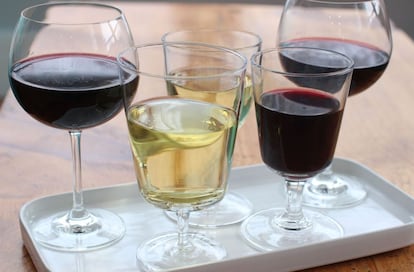Three-quarters of at-risk drinkers in Spain unaware of dangers of alcohol
One in every six Spaniards over the age of 18 consumes worrying amounts of booze

Around one in six Spaniards over the age of 18, or 17.1% of the population, drinks too much. That’s according to a survey conducted by Danish pharmaceuticals company Lundbeck, and which was presented on Wednesday in Madrid by a panel of experts.
“Spain is always among the countries with the highest alcohol consumption, along with France, Portugal, and Italy,” said Julio Bobes, president of Socidrogalcohol, a research organization into alcohol and drug dependence. “But just as important as the data, or more so, is the trend,” added Antoni Gual of Barcelona’s Hospital Clinic. Gual highlighted how when a comparison is made between respondents’ understanding of the risk they face (4,250 interviews throughout Spain with a 5% margin of error) there is a clear imbalance: compared to that 17.1%, who – according to what they say they consume – is at risk, only 1.3% say they drink too much. That’s to say, 76% of people who drink too much believe their intake levels are normal.
“Spain is always among the countries with the highest alcohol consumption, along with France, Portugal and Italy”
Calculations about who is a risk drinker are measured in two ways, based on the type of drinker: daily consumers, as is typical in Mediterranean countries; or weekend boozers – characterized by the so-called binge drinking common in the United Kingdom. Each glass of beer, wine, or shot counts as a unit of alcohol (spirits with mixers equal two units). A man is considered at risk if his intake is four or more units of alcohol per day, or five or more during a binge. In the case of women, who generally weigh less than men, the limits fall to two and four, respectively.
Gual highlighted that the survey also shows how one in five Spaniards are teetotal, contradicting the widely held belief that “everybody drinks: in fact only 23.5% of people in Spain drink more than twice a week.”
Younger people drink more
The survey shows that in general, 18- to 25-year-olds drink the most, and men more than women: 19.6% and 14.5%, respectively, are considered at risk; conversely, 16.6% of men were teetotal, a figure that rose to 27% for women. Bobes highlighted the dangers of drinking at an early age, saying that the brain was still developing until our mid-twenties and that alcohol interferes with the process.
Also at the presentation was José Ángel Arbesú of the Spanish Association of Primary Care Medics (Semergen), who underscored the problem Spanish society has in recognizing that alcoholism is a danger to health, pointing out that 12.4% of respondents to the Lundbeck survey believed that alcoholism is a vice, while 33.7% described it as an illness that starts with a vice. This belief delays alcoholics from seeking help, when “the most important thing is to be aware that there is a health problem,” said Arbesú, noting that around 40,000 people die each year in Spain from alcohol-related illnesses: “There are up to 64 illnesses directly and indirectly related to alcohol, such as hepatitis, cancer, and mental illness”
Calculations about who is a risk drinker are based on the type of drinker: daily consumers or weekend boozers
Javier Zarco of the Spanish Society for Family and Community Medicine (Semfyc) said that Spain’s general practitioners are trained to deal with people with alcohol problems, noting that the survey reflected the public’s confidence in their doctors, with most people saying this would be their first port of call when seeking help, followed by associations such as Alcoholics Anonymous and specialist treatment centers. Coming a distant fourth were psychologists, although younger respondents said they were more likely to seek help from this source. “This is an important point because there aren’t many psychologists working in local health centers,” he warned.
The panel of experts at the Lundbeck presentation called for legislation to regulate alcohol consumption, with Bobes accusing politicians of failing to act. Gual called for laws not only to regulate price and access to alcohol, but for controls on advertising: “Each day, the industry spends a million euros promoting alcoholic drinks. This is not ethical.”
Tu suscripción se está usando en otro dispositivo
¿Quieres añadir otro usuario a tu suscripción?
Si continúas leyendo en este dispositivo, no se podrá leer en el otro.
FlechaTu suscripción se está usando en otro dispositivo y solo puedes acceder a EL PAÍS desde un dispositivo a la vez.
Si quieres compartir tu cuenta, cambia tu suscripción a la modalidad Premium, así podrás añadir otro usuario. Cada uno accederá con su propia cuenta de email, lo que os permitirá personalizar vuestra experiencia en EL PAÍS.
¿Tienes una suscripción de empresa? Accede aquí para contratar más cuentas.
En el caso de no saber quién está usando tu cuenta, te recomendamos cambiar tu contraseña aquí.
Si decides continuar compartiendo tu cuenta, este mensaje se mostrará en tu dispositivo y en el de la otra persona que está usando tu cuenta de forma indefinida, afectando a tu experiencia de lectura. Puedes consultar aquí los términos y condiciones de la suscripción digital.








































